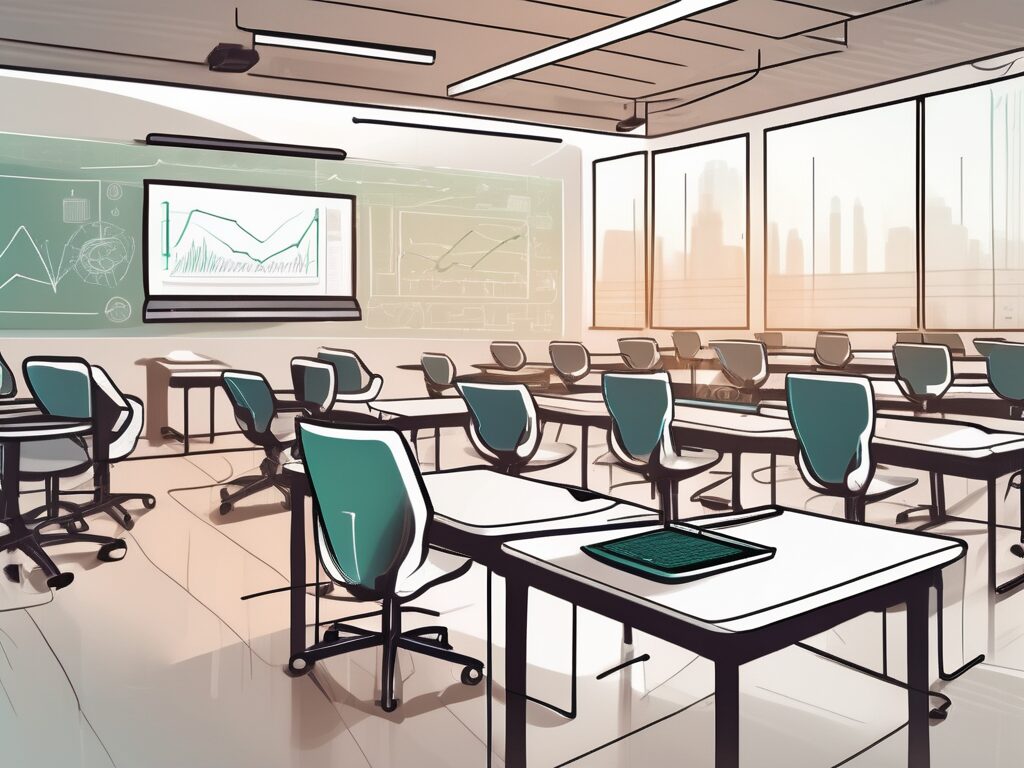In the realm of education, technology has become a game-changer, transforming traditional teaching methods into interactive and engaging experiences. This is particularly true in Saudi Arabia, where the integration of technology in classrooms is revolutionising the learning process. In this piece, we will delve into four methods through which technology is being utilised in Saudi Arabian classrooms.
1. Interactive Whiteboards
Interactive whiteboards have replaced the traditional chalk and blackboard method in many Saudi Arabian classrooms. These high-tech boards are akin to a computer screen, allowing teachers to display text, images, and videos directly from their computers.
The use of interactive whiteboards not only makes the lesson more visually appealing but also encourages student participation. For instance, students can solve problems on the board, making learning a more hands-on experience. It’s a bit like swapping out your old telly for a smart TV – the difference in engagement and interactivity is palpable.
The Benefits of Interactive Whiteboards
Interactive whiteboards offer several benefits. They cater to different learning styles, accommodating both visual and auditory learners. The boards also allow for real-time editing and feedback, which can help students grasp concepts more quickly.
Moreover, these boards can store information, making it easy for teachers to revisit previous lessons or share notes with students. It’s a bit like having a personal assistant, keeping track of all your notes and ideas.
2. Tablets and Mobile Learning
Tablets and mobile devices are becoming increasingly common in Saudi Arabian classrooms. These devices offer a wealth of educational apps and resources, making learning more interactive and engaging.
Imagine swapping out your textbook for a tablet. Instead of flipping through pages, you can tap and swipe your way through interactive lessons, videos, and quizzes. It’s a more dynamic and engaging way to learn.
The Benefits of Tablets and Mobile Learning
Tablets and mobile devices offer several benefits. They provide access to a wealth of educational resources, from e-books to educational apps. They also promote self-paced learning, allowing students to learn at their own speed.
Moreover, these devices can facilitate collaboration, enabling students to work together on projects or share notes. It’s a bit like having a study group at your fingertips.
3. Virtual Reality (VR) and Augmented Reality (AR)
Virtual Reality (VR) and Augmented Reality (AR) are making their way into Saudi Arabian classrooms, offering immersive learning experiences. These technologies can transport students to different places and times, making lessons more engaging and memorable.
Imagine strapping on a VR headset and walking through the ancient pyramids of Egypt, or using AR to see how a human heart functions. It’s a bit like stepping into a time machine or a science lab, all from the comfort of your classroom.
The Benefits of VR and AR
VR and AR offer several benefits. They can make learning more engaging and memorable, helping students to retain information. They also offer practical learning experiences, allowing students to explore and interact with different environments.
Moreover, these technologies can cater to different learning styles, accommodating both visual and kinesthetic learners. It’s a bit like having a personal tutor, offering tailored learning experiences.
4. Learning Management Systems (LMS)
Learning Management Systems (LMS) are becoming increasingly popular in Saudi Arabian classrooms. These platforms provide a centralised place for teachers and students to manage and access educational resources.
Imagine having a digital classroom where you can access lessons, assignments, and grades, all in one place. It’s a bit like having a personal organiser for your studies.
The Benefits of LMS
LMS offer several benefits. They provide a centralised place for educational resources, making it easy for students to access and manage their learning. They also promote self-paced learning, allowing students to learn at their own speed.
Moreover, these platforms can facilitate communication and collaboration, enabling teachers and students to share resources and feedback. It’s a bit like having a digital study group, available 24/7.
In conclusion, technology is transforming education in Saudi Arabia, making learning more interactive, engaging, and personalised. From interactive whiteboards to VR, these technologies are revolutionising the way students learn and teachers teach. So, let’s embrace these changes and look forward to a future where learning is not just about memorising facts, but about exploring, interacting, and engaging with the world around us.
Advance Your Teaching Career with IPGCE
As technology redefines educational landscapes in Saudi Arabia and beyond, the demand for qualified educators with a global perspective and technological proficiency is on the rise. IPGCE is your gateway to not only meeting these demands but also propelling your teaching career to new heights. Embrace the opportunity to enhance your qualifications, connect with a worldwide network of professionals, and gain a deep understanding of international curricula. With flexible online study options tailored for working teachers, the International Postgraduate Certificate in Education is the practical solution to advancing your career while maintaining your current commitments. Don’t let inadequate credentials or isolation limit your potential. Join the UK’s #1 Teacher Training Course today and be part of the educational transformation.

